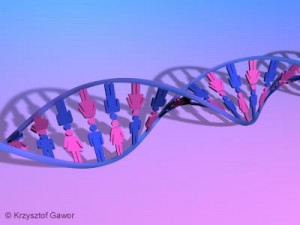Throughout the world, scientists are attempting to recognize and treat schizophrenic disorders at an earlier stage. It is hoped that this will improve the prognosis, which has often been unfavorable. In the latest edition of Deutsches Ärzteblatt International (Dtsch Arztebl Int 2008; 105[30]: 532-9), Joachim Klosterkötter of the Department of Psychiatry and Psychotherapy at Cologne University describes the current state of research into the prevention of schizophrenic disorders and explains how the individual risk of the disease can be assessed and the threat of the initial episode of schizophrenia can be avoided. [continue reading…]
Schizophrenia
 Scientists from the University have identified a risk gene associated with the mental health disorder schizophrenia.
Scientists from the University have identified a risk gene associated with the mental health disorder schizophrenia.
An international group of researchers, led by Professors Michael O’Donovan, Nick Craddock, and Michael Owen from the School of Medicine examined DNA samples from over 7,000 individuals with schizophrenia, and almost 13,000 people without the disorder. [continue reading…]
Both schizophrenia and bipolar disorder can be disabling conditions, and both present clinically with significant mood and psychotic symptoms. These two illnesses also share genetic variants that might be involved in the predisposition to both disorders. A new study scheduled for publication in the July 15th issue of Biological Psychiatry sought to analyze the patterns of gene expression in the brains of individuals diagnosed with one of these disorders to search for a common “characteristic [genetic] signature.” [continue reading…]
 Watch this facinating series these time-lapse animations, compiled from brain scans taken over many years, neurologist Paul Thompson of the University of California, Los Angeles, describes brain maturation in children with and without schizophrenia. Move the slider beneath the image to see the changes over time.
Watch this facinating series these time-lapse animations, compiled from brain scans taken over many years, neurologist Paul Thompson of the University of California, Los Angeles, describes brain maturation in children with and without schizophrenia. Move the slider beneath the image to see the changes over time.
Read Benedict Carey’s article From the Elusiveness of Schizophrenia, New Clues to Treatment Published June 13, 2008 in the New York Times
The people who suffer from schizophrenia are hardly the only ones confounded by its symptoms. Scientists are baffled, too, and despite years of study they’ve had little success in explaining how the disorder develops, in whom, and why.
Yet there’s a restless energy among psychiatric researchers now, and it’s in part because of several recent studies that, paradoxically, reveal how insufficient current theories about schizophrenia are.
Source: New York Times
Â
